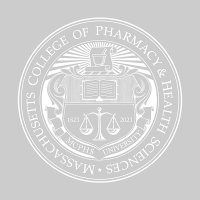Following a Botanical Path to Better Drug Testing
By Jennifer PersonsDr. Matthew Metcalf’s research at MCPHS shows how plants can be used to test the effects of certain drugs.
In “The Wizard of Oz,” Dorothy and her friends follow the Yellow Brick Road through a field of poppies on their journey to the Emerald City. A trick from the Wicked Witch of the West, the poppies lull the group into a deep sleep.
This somniferous effect happens because the poppy plant produces opium, a powerful narcotic from which several drugs are derived. This biochemical process fascinates Dr. Matthew Metcalf.
“I’ve been really curious about opioid activity in plants since my graduate studies,” he said. “I wanted to know why the poppy plant would spend so much biochemical energy synthesizing opioids.”
Although he hasn’t yet found a satisfactory answer to his question about opioids in poppies, his curiosity inspired his current work. After more than a decade of research, trials, and errors, Metcalf, PharmD, PhD, is successfully testing drugs on plants.
Starting from the Ground Up
When Dr. Metcalf first started researching poppy plants, he came across the work of Dr. David Macht, who conducted much of his research in the 1920s and ‘30s. In addition to being a top opioid researcher at the time, he was also testing drugs on plants.
“At first I tried to replicate his tests to see if opioids like morphine had any effect on the root growth of pea seedlings,” Dr. Metcalf said. “However, they didn’t seem to have any effect at all.”
He wasn’t deterred. He continued testing other drugs, hoping to find some insights that would be helpful. Eventually, he landed on the right track.
With limited time and budget, he started developing test protocols, making adjustments based on what worked, and performing countless variations of the tests. Over the years, he and his Doctor of Pharmacy student assistants, including from the Summer Undergraduate Research Fellowship Program and Center for Research and Discovery Mini Grant recipients, to help. They were instrumental in growing and keeping the plants alive, as well as testing and monitoring their responses to the drugs.
“We have collected great pharmacological data that shows the drugs significantly inhibit pea seedling root growth,” he said. “Our tests show very clear, statistically significant results.”
Dr. Metcalf didn’t stop there. He started developing a second test after finding literature suggesting certain drugs may also affect Mimosa pudica plants. This time, he wanted to see how the drugs affected the ability of the plant’s leaves to fold and reopen after being touched.
Just like with the pea seedlings, there was a similar and noticeable effect.
“I have an argument that these drugs are acting through a specific system in two different plant types,” he explained. “These tests demonstrate the concept works, is specific and is a viable alternative for drug testing.”
One Small Step
Dr. Metcalf began this work hoping to find a more affordable, more ethical way to test drugs. While he’s excited about the results, he emphasized this is just one small part of a much larger effort to enact widespread change.
As Dr. Metcalf compiles the final data and prepares to publish his research, he said he hopes it will inspire others to build on his work and take plant drug testing to the next level.
“The question is, how much of the drug testing process can be done on plants,” he said. “That’s way beyond me alone, and these are just the initial steps in the process to get there.”
Featured Connections
Schools
Programs
Centers for Excellence
People

More University News
‘We Were Instant Friends’: From White Coats to Wedding Vows
For MCPHS Manchester alumni Megan and Joel Brown, pharmacy school sparked a love story that came full circle on campus.
This is MCPHS: ‘Everybody Here is Like a Family’
An accelerated PharmD student finds confidence, connection, and her place in Manchester.
Pharmacy in the Family: How a Professor Followed Father’s Path to MCPHS
Growing up, Dr. Kaelen Dunican lived above her dad’s pharmacy. She went on to attend and become an interprofessional education leader at his alma mater.
‘Purpose and Passion’: MCPHS Manchester Students Showcase Research
From pharmacy deserts to Gen Z learning strategies, student researchers explored timely issues shaping the future of healthcare.

